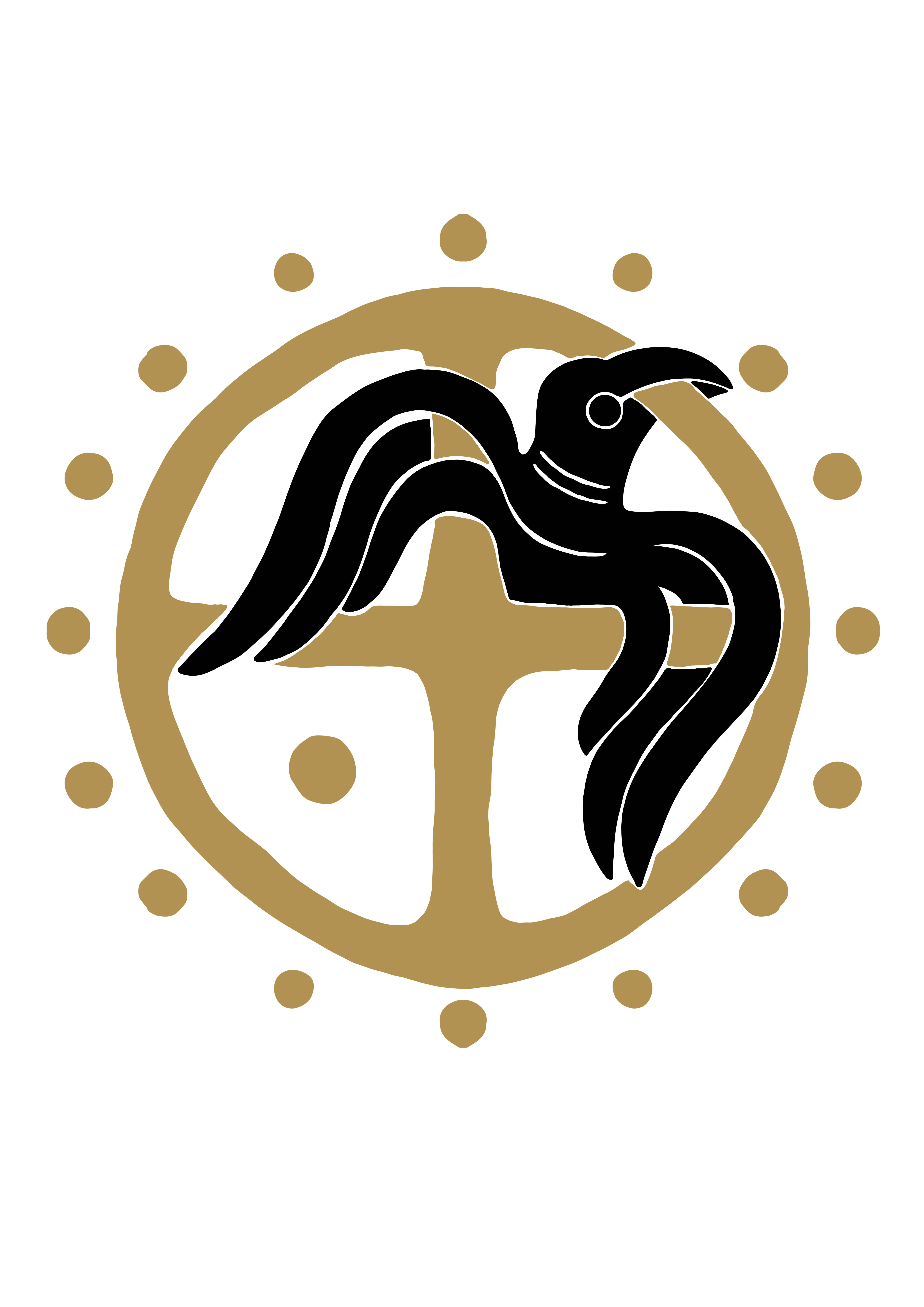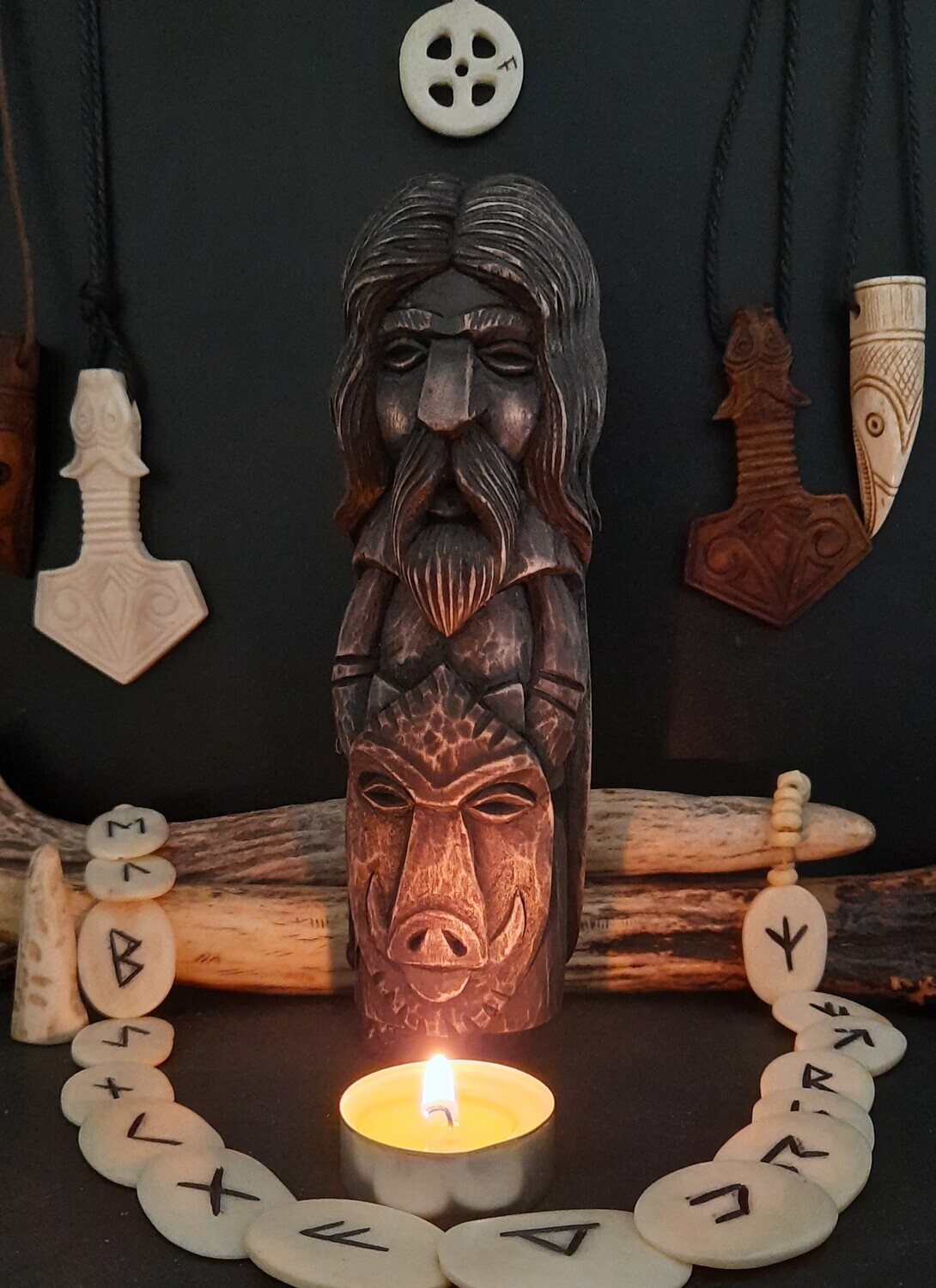God Freyr Idol for Norse Pagan Altar, unique wood carving, handmade Scandinavian god figurine
Germanic God Freyr Wooden Figurine
Material: linden wood (basswood, lime tree), linseed oil with wax
Size: 18 cm / 7.1 inches
Here are a few prayers that may be used to invoke Freyr:
- "Freyr, lord of fertility and abundance, we offer this prayer to honor your power and protection. Grant us your blessings of growth and prosperity, that we may be fruitful and successful in all our endeavors. Hail Freyr!"
- "Mighty Freyr, god of peace and prosperity, we call upon you now to lend us your strength and wisdom. Help us to navigate the challenges of life with grace and dignity, and guide us towards the path of prosperity and success. Hail Freyr!"
- "O Freyr, god of the harvest and patron of farmers, we seek your aid in tending to the land and the fruits of the earth. Grant us your blessings of growth and abundance, that we may reap a bountiful harvest and honor your legacy. Hail Freyr!"
Freyr is a god in Germanic mythology and a member of the Vanir, one of the two main tribes of gods in Norse mythology (the other being the Æsir). Freyr was associated with fertility, prosperity, and peace, and was often invoked by farmers and those seeking abundance and good fortune.
Freyr was considered to be one of the most important gods in the Vanir pantheon, and his worship was widespread throughout Scandinavia and northern Germany during the Viking Age. He was often associated with the sun, and was believed to be a bringer of light, warmth, and growth.
In addition to his association with fertility and prosperity, Freyr was also seen as a protector of the people and a patron of warriors. He was often depicted with a sword, which was believed to have magical powers, and was said to be able to defeat enemies and protect his followers from harm.
One of the most famous stories about Freyr is his romance with the giantess Gerd. According to legend, Freyr fell in love with Gerd and sent his messenger, Skirnir, to win her hand in marriage. Skirnir used a combination of threats and promises to convince Gerd to marry Freyr, and the two were eventually wed in a grand ceremony.
Freyr's importance in the Germanic pantheon can be seen in his inclusion in several of the most important myths and legends of Norse mythology, as well as in the many place names and personal names that are associated with him. Today, many followers of modern Norse-inspired spiritual practices, such as Asatru and Heathenry, continue to honor and invoke Freyr as a powerful and benevolent deity.
Freyr
Norse mythology, Germanic Paganism religion
Freyr, also spelled Frey, also called Yngvi, in Norse mythology, the ruler of peace and fertility, rain, and sunshine and the son of the sea god Njörd. Although originally one of the Vanir tribe, he was included with the Aesir. Gerd, daughter of the giant Gymir, was his wife. Worshiped especially in Sweden, he was also well-known in Norway and Iceland. His sister and female counterpart, Freyja, was goddess of love, fertility, battle, and death. The boar was sacred to both. Freyr and Freyja figure in many lays and stories of medieval Iceland.
Alternate titles: Frey, Fricco, Ing, Yngvi, Yngvi-Freyr
Frey and Freya were Vanir deities associated with agriculture and subordinate to the warlike Aesir gods, who were associated with battle and victory. According to the myths, war had once broken out between the Aesir gods and the Vanir gods. As a part of the peace treaty there was an exchange of hostages, and Njord, Frey, and Freya left Vanaheim, the home of the Vanir, and went to live with the Aesir gods in Asgard.
In Asgard, Njord was married to Skadi, daughter of a giant named Thiassi, but according to one account, the mother of Frey and Freya was Njord’s own sister, whom he had married in Vanaheim before he became a hostage.
Frey ruled the domain of elves. He had a magical horse named Blodighofi (Bloody-Hoof). He also drove a shining chariot that could travel over both air and sea, as easily at night as during the day. This chariot was drawn by a boar with golden bristles called Gullenbursti. A boar cult was thus associated with Frey; even today in Sweden a custom survives in which Yule cakes are baked in the shape of a boar. In several sources Frey is described as the ancestor of the line of Swedish kings.
Frey’s magical ship, Skidbladnir, always made straight for its destination and was big enough to hold all the Aesir in their battle array, but portable enough to fold up into Frey’s pocket when on land.
Frey married Gerd, daughter of the mountain giants Gymir and Aurboda, after a long bout of lovesickness. Frey had one day ventured to sit on Odin’s high throne, Hlidskjalf, from which one could see everything everywhere. In faraway northern Jotunheim, the land of giants, Frey spied a large homestead belonging to Gerd’s father. Frey saw Gerd walking into a building there and was overwhelmed by her beauty. He fell deeply in love and began pining desperately for Gerd. He left Odin’s throne, full of grief. When he got home he would not speak or sleep or drink. Njord asked Frey’s servant Skirnir to find out what was wrong with his son. Frey confessed to Skirnir that he was so full of grief for love of Gerd that he would not live much longer if he could not have her.
Skirnir agreed to go to Jotunheim and ask for Gerd’s hand on Frey’s behalf, if Frey would give him his sword, a magic weapon that would swing itself. Skirnir went on the errand and got Gerd to agree to marry Frey. She said she would meet Frey and marry him in a sacred wood called Barey nine nights later. When Skirnir took her reply back to Frey, his heart was filled with joy.
At the time of Ragnarok, the final battle between the gods and the forces of evil that would take place at the end of the world, Frey was destined to be one of the first gods to die; he would fight the fire giant Surt and would perish because he no longer had his magic sword
The beginning and end of the world is told in Völuspá, the first and best known poem in the Poetic Edda. The seeress in Völuspá tells of how the world began with a great magical nothingness called Ginnungagap, until Odin and his two brothers raised the Earth from the sea. They came across the tree trunks Ask and Embla, whom they created into the first human couple.
The accounts of Völuspá are contrasted with those in Vafþrúðnismál and Grímnismál. These say that Odin created the world from the body of the giant Ymir. Odin and his brothers were in turn descended from Búri, who had been created by the primeval cow Auðumbla. Parallels to Auðumbla are found in Indo-Iranian religion, testifying to the ancient Indo-European origins of Germanic mythology.
A central point in the Germanic cosmos is the tree Yggdrasil. Germanic mythology prophesises the end of the world in a coming Ragnarök.
Deities: A number of Germanic gods are mentioned in Old Norse literature and they are divided into the Æsir and the Vanir. The Æsir are primarily gods of war and dominate the latter, who are gods of fertility and wealth.
The chief god of the Æsir is Odin, the god of war and wisdom. He was probably worshipped primarily by kings and noblemen rather than the common people. Odin is the lord of Asgard, the abode of the gods, which includes the majestic hall Valhalla, where warriors who died a heroic death in battle (Einherjar) were admitted in order to prepare them to help Odin in the coming Ragnarök.
Odin's son, by his wife Frigg, was Thor, the god of thunder. Wielding his hammer Mjölnir, Thor engaged in conflict with the jötnar (giants) and the serpent Jörmungandr. Thor has many parallels in Indo-European mythology. He appears to have been worshiped extensively by the Germanic peoples, particularly warriors and the common people. A notable brother of Thor is Baldr. Other significant Æsir include the trickster god Loki; Heimdallr, who is reported in Rígsþula to have fathered the three classes of men; and the god of war Týr, who appears to have preceded Odin as the chief deity in the Germanic pantheon.
In Old Norse literature, the Æsir and Vanir are described as being in conflict. Through this conflict, certain Vanir gods, such as Njörðr, Freyja, and Freyr, join the Æsir. Similarities have been pointed out between Njörðr and Nerthus, a Germanic fertility god mentioned by Tacitus in Germania in the 1st-century AD. Sources also mention numerous other entities, such as Hel, who oversees an underworld location of the same name.
Tags: Old Norse God Freyr, Norse Pagan Altar. Wiccan god Freyr. Norse paganism. Medieval Viking gods totems, hand-carved God Frey figurine pagan gifts. Germanic Gods altar idols
#FreyrAltar #PaganIdol #HandCarved #WoodenIdol #vikinggod #NorsePaganism #Asatru #Heathen #FertilityGod #ProsperityDeity #paganaltargift #NorseMythology #Worship #Spirits #DivineEnergy #PaganArt #SacredSpace #AltarDecor #Woodworking #NaturalMaterials #Craftsmanship #idols #handmade #pagan #altar #paganism #gift #scandinavian #mythology #godfrey #frejrhandmadetotem #vikingcrafts #asatrualtarpiece

